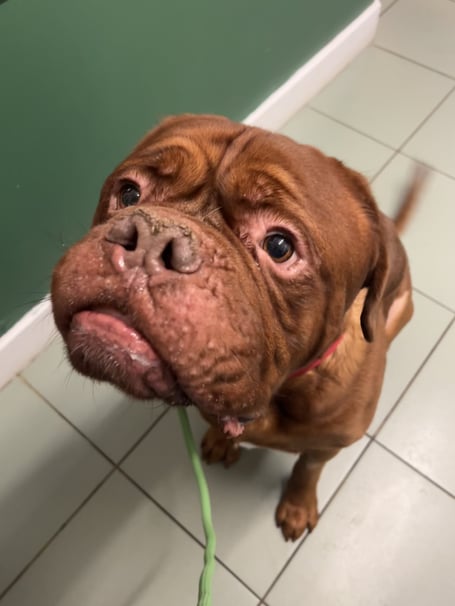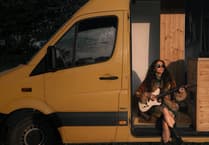Meet Cooper – he’s a Dogue de Bordeaux (a DDB - basically a French mastiff) and weighs in at more than seven stone.
If you own a similarly-sized dog, particularly one with a deep chest, then please read on because this article could save your dog’s life.
Cooper came to us a few weeks ago because his owner was moving abroad.
He’s four years old and so, for a large dog, this is ‘middle age’, but he was in good health aside from a few skin issues.
He had just begun a meeting with prospective new owners when a member of the kennels team noticed that he wasn’t moving as freely as usual, and that he seemed quieter and more subdued than the normal Cooper.
Also worthy of note is the fact that Cooper wasn’t dribbling as he normally does.
Cooper’s stomach was slightly enlarged, and the team suspected he may have a condition called gastric dilation volvulus (GDV).
GDV causes a dog’s stomach to fill with gas, overstretch and then twist.
As well as a distended stomach common symptoms include pale gums, an increased respiratory rate, and a decreased appetite.
As with severe colic in horses, or bloat in sheep, GDV is usually fatal if not treated within a few hours.
A vet will take x-rays and an electrocardiogram to assess the severity of the condition, with a view to performing surgery if the problem has been caught in time and the dog is deemed likely to survive the procedure.
The surgery involves untwisting the stomach, removing parts of it if necessary, and then permanently stitching it to the abdominal wall (a gastropexy).
This should prevent rotation if subsequent gas build-up occurs. For dogs who are at high-risk of GDV, vets are now offering to perform this procedure at the same time as neutering them.
So what causes GDV?
It can occur as a result of exercising too soon after eating, eating too quickly, gulping down a large quantity of water, or as a result of stress or fear.
It can occur in any dog, but the larger breeds are much more susceptible. In a recent study the top three breeds found to be at risk were the great Dane, the St Bernard and the Weimaraner.
Cooper survived his operation, but came back to the kennels with a scar that runs the entire length of his under belly.
He was kept on ‘pen rest’ for several days with only short walks, and these have gradually been extended as he starts to heal.
But it’s a slow process – not that Cooper seems particularly bothered. He’s incredibly laid back and sociable, and hasn’t looked at all sorry for himself.
He has a super personality, very sweet and loving, which is characteristic of the Dogue de Bordeaux breed which is often described as a ‘gentle giant’.
The breed dates back to the 14th century when DDBs were used for hunting and for guarding French estates, but they are seldom used as working dogs these days because they are fundamentally lazy and incredibly friendly.
They are happiest when they’re with a family, and will readily fall asleep next to their humans, grunting and snoring loudly, and drooling excessively.
Cooper is not out of the woods yet, but his prospective new owners visit him regularly and are still keen to rehome him.
He’s a lot of dog, but he has been well trained and socialised which is an absolute necessity given he is likely to be stronger (possibly even heavier) than the human handling him.
The costs of Cooper’s veterinary care will reach several thousand pounds.
As well as highlighting the risks of GDV, his story should also serve as a timely reminder that if you don’t have your dog insured you should try to keep funds in reserve so that you can afford to pay for necessary veterinary treatment





Comments
This article has no comments yet. Be the first to leave a comment.